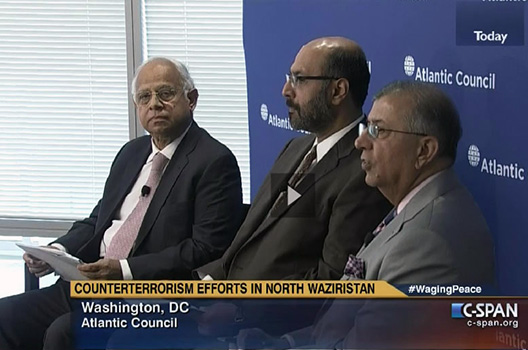 The Pakistani Army’s current offensive in the North Waziristan has achieved “domination of the area, which prevents militants from coming back,” according to Ikram Sehgal, a Pakistani defense analyst. Until June, North Waziristan was the only tribal agency in Pakistan’s Federally Administered Tribal Areas (FATA) that had not been targeted by a major military offensive. The area has been infested with a large variety of militant groups, including the Pakistan Taliban (TTP), Al Qaeda, the Afghan Haqqani Network, and the Islamic Movement of Uzbekistan.
The Pakistani Army’s current offensive in the North Waziristan has achieved “domination of the area, which prevents militants from coming back,” according to Ikram Sehgal, a Pakistani defense analyst. Until June, North Waziristan was the only tribal agency in Pakistan’s Federally Administered Tribal Areas (FATA) that had not been targeted by a major military offensive. The area has been infested with a large variety of militant groups, including the Pakistan Taliban (TTP), Al Qaeda, the Afghan Haqqani Network, and the Islamic Movement of Uzbekistan.
But the military’s success in routing Taliban militants from North Waziristan will not determine the long term success of the operation without adequate steps being taken by the civilian government to control terrorism. According to Dr. Hassan Abbas, author of ‘The Taliban Revival’ and a professor at National Defense University, “kinetic action is extremely necessary, but we have seen consistent failure of counter-insurgency operations that rely solely on kinetic operations.”
The path to Waziristan
The native tribes of the region had a peace treaty with Pakistan’s Army dating back to 2006, but this treaty was violated over the past several years as various militant groups used North Waziristan as an operational base to strike targets within both Afghanistan and Pakistan. After clearing major Taliban strongholds in the Swat district and South Waziristan Agency in 2009, commanders on the ground in Waziristan and coalition forces in Afghanistan hoped that the campaign would immediately expand into North Waziristan, according to Sehgal. Though the former Chief of Army Staff General Kayani delayed the operation, it became a necessity after peace talks failed and the TTP claimed responsibility for attacking the Karachi airport. Both Mr. Sehgal and Dr. Abbas argue that the current operation has effectively dismantled the entire logistical framework and infrastructure of the militias in the region.
The need for civilian leadership
Both Sehgal and Abbas highlighted the lack of coordination between different elements of state power in addressing challenges stemming from Pakistan’s western border. Abbas lamented that not only is there a lack of coordination between civilian and military leaders on counterinsurgency and counterterrorism strategy, but even the police chiefs of Pakistan’s four provinces are insufficiently informed and equipped to tackle the threat posed by militants in urban areas. In conjunction with the army’s initiatives to fight militant sanctuaries in the tribal areas, the civilian government will need to take political ownership and develop a national security strategy in order to stem the threat in the long run.
Sehgal suggests that Pakistan needs a “dedicated, separate counterterrorism force,” in order to deal with the flow of militants from the tribal areas to settled areas. He hopes that 1.1 million internally displaced persons would return to North Waziristan before the winter. Nevertheless, the challenge of providing relief to them after the operation is immense. Describing the tribal areas as one of the most underdeveloped areas of Pakistan, Sehgal emphasized the need to give the people of FATA a means of revenue. Not only would improvement of local economic conditions shrink the recruiting pool for militants, it would give tribes a reason to protect their turf from non-state actors.
Challenges for the future
One of the most contentious issues surrounding the North Waziristan operation is the lack of coordination between Afghan and Pakistani Security forces. While Pakistan’s army alleges that Afghanistan is sheltering and supporting the Pakistani Taliban (TTP), the Afghan security forces regularly accuse Islamabad of using the Haqqani network as a proxy on their soil. Both analysts agreed that the current level of coordination between the two armed forces is unsatisfactory. Sehgal referred to past cooperation between Afghanistan’s National Security Directorate and senior leadership of the TTP, and said that it would be a nightmare for Pakistan if the Afghan and Pakistani Taliban groups coalesce and synchronize strategies.
Abbas stated that “the Haqqani Network is not being provided a sanctuary, but not being directly targeted,” either. He anticipates that Pakistan’s relations with India and Afghanistan will rise in importance as the United States draws its forces away from the region, given that non-state actors with a common ideology are threatening all three countries. Sehgal pointed out that the vast majority of the Pakistani Army’s high command has combat experience, and he confidently exclaimed: “we are going to win this war.” Abbas conceded that the operation will successfully yield a significant reduction of terrorist attacks in Pakistan in the short-run, but his hopes for the long run are more uncertain: “if there is a long term plan, someone is keeping it close to their chest.”
